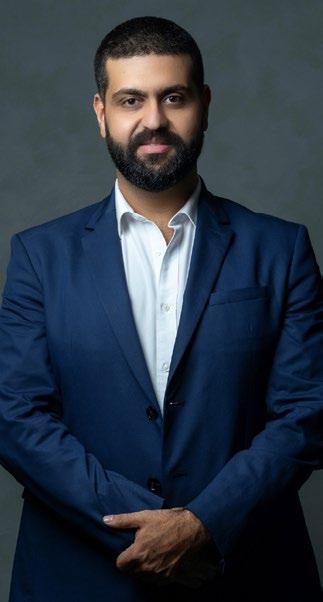
3 minute read
Majd Fayyad
DSM Strategy & Policy Lead, Dubai Supreme Council of Energy

Advertisement
HOW ARE YOU FACING THE CLIMATE CRISIS?
With the world hitting +1.1 degrees C in global warming, people on every continent have felt the impacts of climate change, with heatwaves and storms hitting many parts of the world. There is no doubt that climate change is the defining crisis of our generation, yet we are not powerless in the face of this threat. Dubai recognized the climate risks early on and developed a strong strategic framework alongside the implementation of a mechanism to help in combating this crisis.
In 2021, H.H. Sheikh Ahmed Bin Saeed Al Maktoum, the Chairman of Dubai Supreme Council of Energy, issued the DSCE Resolution No. 6 of 2021 on Dubai’s commitment to achieve carbon neutrality by 2050, aligning with UAE’s net zero target and global efforts in this regard. Recognizing the importance of energy efficiency in delivering carbon neutrality targets and reducing energy demand, Dubai has pioneered regional efforts by developing the first-of-its-kind strategy in the MENA region to focus on Demand Side Management. Dubai is committed to becoming a leader in the efficient management of electricity and water as well as fuel usage via collaboration with businesses and citizens.
In 2023, we celebrate 10 years of successful implementation of the Demand Side Management Strategy (DSM) which aims to reduce energy and water demand in Dubai by 30% by 2030. The strategy reinforces Dubai’s goal of becoming a leader and role model in energy and water efficiency by improving efficiency levels in the whole built environment. This includes buildings, infrastructure, equipment, and processes, as well as the adoption of efficient water resource management processes, and the increasing of the number of electric and hybrid vehicles in Dubai.
COULD YOU OUTLINE YOUR SPECIFIC STRATEGY?
Our strategy focuses on several key things, mainly; increasing energy and water efficiency in new buildings through building regulations and compliance (positioning Dubai to transition towards net zero energy buildings in the long-term), retrofitting existing building stocks and infrastructure with electricity & water efficiency and performance improvement measures. Next, we’re focusing on adopting an energy labeling scheme to classify buildings as efficient or inefficient. We’re also adopting high efficiency lighting in public spaces in Dubai, while promoting efficient cooling technology use in Dubai’s buildings.
Further, we are driving the adoption and compliance with minimum energy performance standards and labels for air conditioners, home appliances and industry equipment in Dubai, and promoting the use of building-level solar energy systems across. Another key step is in adjusting the tariff structure to be cost reflective, promote energy efficiency, and give the right signal to reduce consumption. Other measures include us promoting recycled and ground water management techniques based on network expansion, we also aim to encourage the uptake of efficient mobility and smart charging in Dubai, while promoting efficiency and demand abatement of transportation (fossil) fuels in Dubai. Finally, we’re adopting public green procurement across all local government entities, as well as promoting circular economy principles across public and private entities. We know these measures are working as by the end of 2021, DSM programmes had exceeded both electricity and water targets and saved 6.4 TWh of electricity and 12.2 billion imperial gallons of water. Compared to business-as-usual consumption, which is the reference for the 30% by 2030 target, those savings represent 12.5% and 9.4% of the total baseline consumption for electricity and water, respectively.
HAVE YOU GOT ANY OTHER MAJOR DEVELOPMENTS TO SPEAK OF?
On the transport side, the Dubai Supreme Council of Energy launched the Dubai Green Mobility Initiative to promote sustainable transport solutions in order to reduce road transport emissions within the Emirate and promote green transport policy. Government procurement of electric vehicles has been used as a policy measure to promote green mobility, and in terms of achievements, we are pleased to see more 23,000 hybrid and EV vehicles in Dubai as of September 2022.
We’ve also noted that, for the first time in Dubai, the number of electric vehicles has exceeded the hybrid ones. Moreover, the number of electric vehicles has more than doubled this year compared to last year. No doubt, we still have more work to do ahead, and we aim to advance energy efficiency measures to create an impact to meet our goal to be net zero by 2050. This has never been more important than now, especially when the need to balance our economic growth and sustain our environment for future generations is so paramount.










